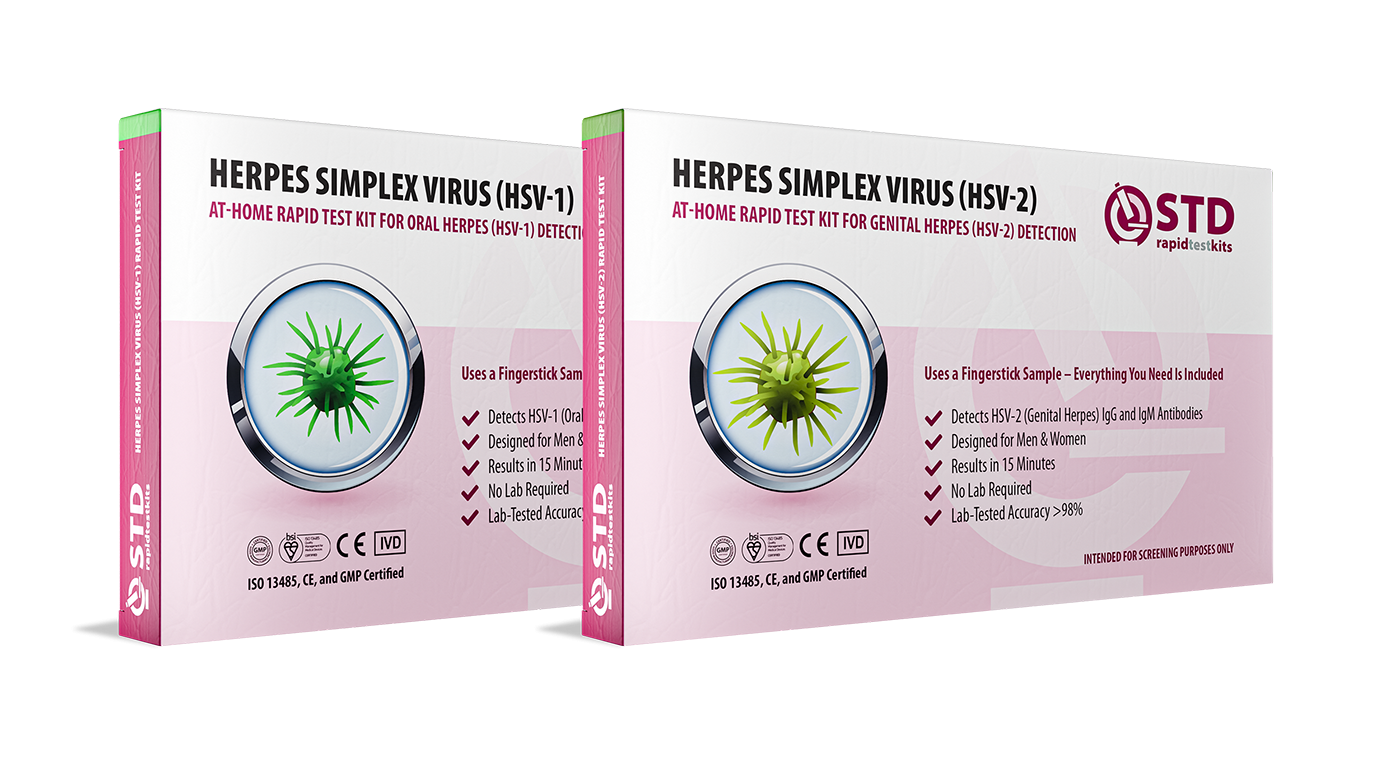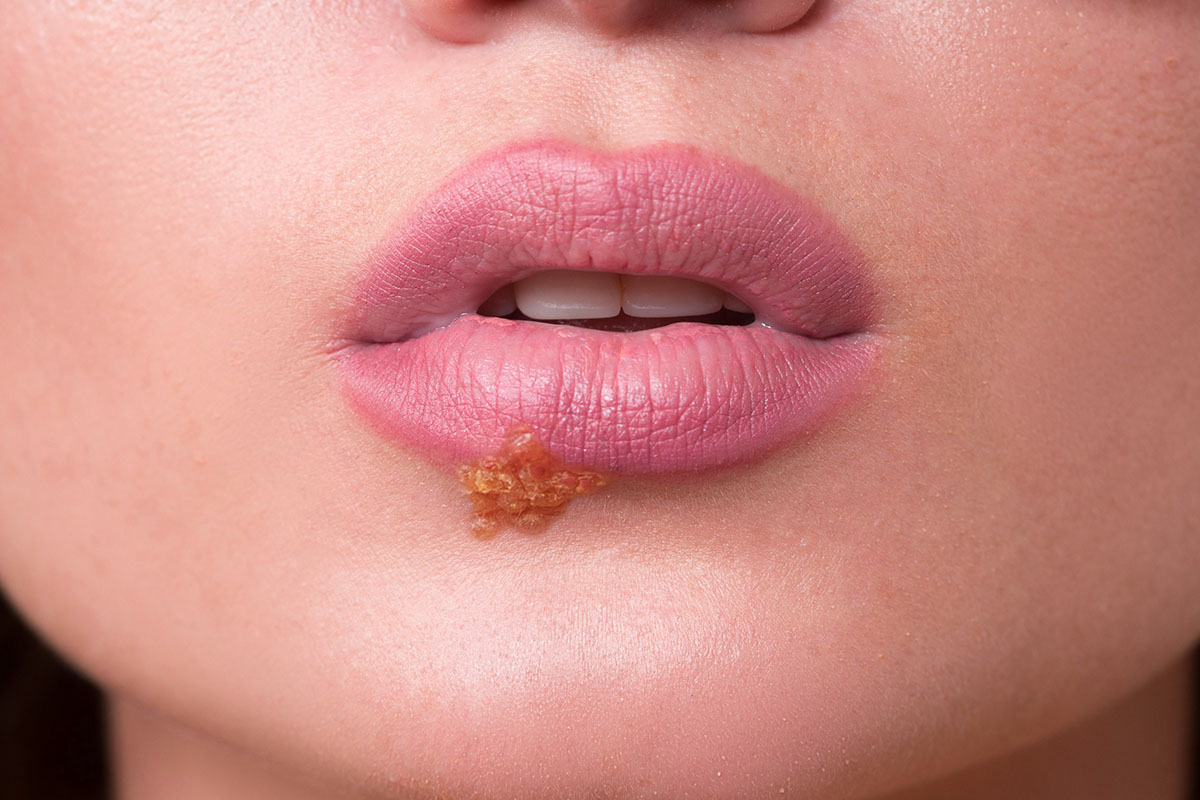How Herpes Spreads Through Kissing (Even Without Symptoms)
Quick Answer Box
Herpes spreads through skin-to-skin contact, oral sex, kissing, and sometimes even when no symptoms are visible. It rarely spreads through objects like utensils or towels, but it doesn’t need intercourse to infect you.
It Doesn’t Take Sex, It Takes Skin
The most important thing to know about herpes? It’s a skin virus, not a sex virus. It lives in nerve endings and travels through friction, heat, and direct contact, not just penetration. That means you can get it from a kiss, a mouth on a thigh, or even just rubbing up against someone during a hookup.
Herpes doesn’t need a climax. It doesn’t need to reach the finish line. It just needs skin, and it’s often happiest in places condoms don’t fully cover. That’s why transmission happens during activities that feel “low risk” or “not really sex.” Grinding in underwear? Yep. Fingering after oral? Possibly. Sitting naked on the same towel? Unlikely, but technically not impossible. This virus isn’t picky, it’s persistent.
People are also looking for: Can I get herpes from towels, toilet seats, or shared razors?
The Kiss That Changed Everything
Let’s talk about kissing, because HSV-1, the oral herpes strain, lives for a good makeout. One kiss from someone with an active cold sore is often all it takes. But here’s what most people miss: herpes can spread even without a visible sore. That’s because of something called asymptomatic viral shedding, when the virus is present on the skin, even though it looks totally normal.
So someone could be “between outbreaks,” not feel a thing, and still pass HSV-1 to your lips. Or your genitals, if it was a kiss down south. This is how so many people get blindsided, especially first-timers or folks who think oral is “safe sex.” It’s emotionally brutal to get herpes from a moment that felt sweet, innocent, or even romantic. But it happens all the time.
Oral Sex: The Herpes Bridge Between Mouths and Genitals
If herpes were a party crasher, oral sex would be its secret entrance. It’s one of the most common, but least acknowledged, transmission routes, especially between HSV-1 and HSV-2.
Here’s how it works: a person with HSV-1 (oral herpes) goes down on someone without knowing they’re shedding the virus. The recipient now has genital herpes caused by HSV-1. Flip the situation and someone with HSV-2 (genital herpes) can transmit it to the giver’s mouth, though that’s rarer.
Most people don’t know their HSV type, which makes these cross-infections hard to track. It’s also why many people end up with genital herpes from their first ever oral encounter, never realizing their partner was infectious.
And remember, herpes doesn’t always show up right away. The virus can hide in your body for weeks, months, or years before an outbreak. So even if you trace back exposure and feel like “it couldn’t have been that,” it could’ve.
Check Your STD Status in Minutes
Test at Home with RemediumGenital & Oral Herpes Test Kit

 For Men & Women
For Men & Women Results in Minutes
Results in Minutes No Lab Needed
No Lab Needed Private & Discreet
Private & DiscreetOrder Now $75.00 $98.00
For all 2 tests
The Cold, Hard Truth About Herpes and Objects
Now let’s tackle the big myths: towels, razors, toilet seats, and utensils.
Can you get herpes from a shared fork? Technically yes, but realistically, no. Herpes is fragile outside the body. It dies quickly on dry surfaces and doesn’t survive well in saliva once exposed to air. So unless the fork was in immediate contact with a sore and went straight into your mouth, it’s extremely unlikely.
Towels are similar. The virus could theoretically live for a few minutes on moist fabric, but actual transmission this way is vanishingly rare. Unless you're rubbing a fresh sore directly into someone else’s genital region with the same towel, which, let’s be honest, isn’t typical use, you’re probably fine.
What’s more likely? Herpes passing through fingers after touching a sore, or shared sex toys that weren’t cleaned. That’s why the CDC and other health bodies don’t list towels or utensils as serious transmission routes, but they do recommend caution with shared objects during outbreaks.
Shedding Without Warning: Herpes at Its Sneakiest
Let’s say you have no sores. No tingling. Nothing feels off. Can you still pass herpes? Yes. That’s the trap.
It’s called asymptomatic shedding, when the herpes virus quietly surfaces on the skin without causing any symptoms. Research shows this happens about 10–20% of days per month for people with HSHSV-2 d slightly less often for HSV-1. That means even when someone looks perfectly “clean,” the virus can be acactive d contagious.
This is why people so often say, “But they didn’t look like they had anything!” It’s also how herpes manages to spread in monogamous relationships, between people who trust each other and feel totally fine. Shedding doesn’t ask permission. It just shows up.
That’s also what makes herpes uniquely infuriating, because you can do everything “right” and still end up with it.
People are also looking for: Should I stop birth control if I have herpes?
The Other Ways In: Fingers, Toys, and Touch
Herpes can be passed by more than mouths and genitals. Let’s talk about fingers.
If someone touches a herpes sore, even unknowingly, and then touches your genitals, lips, or anus, that’s enough. It’s not the most common way herpes spreads, but it’s real. Especially if there are tiny cuts or abrasions involved, or the contact was fast and friction-heavy.
Sex toys? Even riskier. Herpes can survive on surfaces for short periods, especially if they’re moist, warm, and passed between bodies without washing. Shared vibrators, dildos, and other toys can absolutely spread HSV if they’re not covered with condoms or cleaned properly between uses.
If it touches one mucous membrane and then another, it’s a freeway for viral traffic.
Can You Get Herpes Without Any Intimacy at All?
Here’s where things get murky. You won’t catch herpes from a handshake. You won’t get it from a toilet seat. But what about sharing a drink? Or a lip balm? Or a kiss from Grandma?
Technically, yes, herpes can be passed through saliva, particularly HSV-1. But in reality, casual contact like sharing a water bottle rarely results in infection unless one person has an active sore and the other has open skin or a weak immune system.
Still, children often get oral herpes from family members, not from sex or kissing in a romantic way. A peck on the lips from an adult with a cold sore can be enough. That’s why some pediatricians now suggest avoiding lip-to-lip contact with babies during visible outbreaks.
Non-sexual herpes is real. It’s just often misunderstood. It’s not about scandal. It’s about biology.
Check Your STD Status in Minutes
Test at Home with Remedium8-in-1 STD Test Kit

 For Men & Women
For Men & Women Results in Minutes
Results in Minutes No Lab Needed
No Lab Needed Private & Discreet
Private & DiscreetOrder Now $149.00 $392.00
For all 8 tests
Protection That Actually Works (and What Doesn’t)
Condoms
Condoms help, but they're not foolproof. That’s because herpes can live on skin outside the condom-covered area, like the base of the penis, inner thighs, or labia. Barrier protection reduces risk, especially for HSV-2, but it’s not a total guarantee.
Dental Dams
Dental dams are fantastic for oral sex, especially during known outbreaks or with new partners. But let’s be honest: most people don’t use them. That’s partly because herpes isn’t framed as serious enough to “deserve” protection unless there are visible symptoms. That logic doesn’t hold up, though, not when shedding happens silently.
Antiviral Medication
Antiviral medication like valacyclovir or acyclovir also dramatically reduces the risk of transmission. If one partner is HSV-positive and the other isn’t, daily meds can cut risk by 50% or more.
Honesty
Honesty matters too. The safest sex isn’t just about lalatex;t’s about information. If you know your status, and your partner does too, you can make informed choices. That’s real prevention.
Exposure Stories That Don’t Fit the Sex Ed Script
Emma, 20, got oral herpes from a casual makeout with someone she met at a party. No sex. Just kissing.
“I didn’t even know what a cold sore looked like,” she says. “I just thought he had chapped lips.”
Carlos, 32, picked up genital HSV-1 from receiving oral sex. His partner had no sores, no known infection, but was shedding.
“We weren’t even dating. It was just a hookup. I thought oral was the safe thing to do.”
Jules, 26, got herpes from a shared vibrator at a sex party.
“We were using condoms but didn’t change them between people,” they said. “No one talked about it. It felt safe because it wasn’t penetrative.”
These aren’t edge cases. They’re common. They’re just not part of the herpes narrative most people hear. But they should be, because herpes doesn’t care how you define sex. It just follows the skin.
People are also looking for: Is a cold sore contagious even if it looks like a pimple?
Myth-Busting Time: The Things We Still Get Dead Wrong About Herpes
Let’s be blunt. Most of what people think they “know” about herpes comes from high school whispers, bad sex ed, or outdated scare tactics. It’s time to burn that playbook.
Myth 1: Herpes only spreads during sex
Wrong. It spreads through skin. Period.
Myth 2: You’d know if someone had it
Nope. Most people with herpes have no symptoms, or don’t recognize them.
Myth 3: Cold sores aren’t herpes
Yes, they are. They’re HSV-1, and they can become genital herpes through oral sex.
Myth 4: You can’t get herpes if you use condoms
Condoms help. But herpes doesn’t stay inside the lines. It sheds from places condoms don’t cover.
Myth 5: Herpes means your sex life is over.
Absolutely not. People with herpes date, fall in love, have kids, and have great sex all the time. It's an infection, not a character flaw.
When we treat herpes like a dirty secret, we lose out on prevention, compassion, and truth. Let's change that.
FAQs
1. Can I get herpes from sharing a drink?
It’s very unlikely unless the drink was shared immediately after contact with an active sore.
2. What if my partner has herpes but isn’t showing symptoms?
They can still transmit it. That’s called asymptomatic shedding.
3. Can I get HSV-2 in my mouth?
Yes, though it’s less common than genital HSV-2. It can happen through oral-genital contact.
4. How long does herpes live on surfaces?
Only a few seconds to minutes on dry surfaces. Longer on moist ones, but still rare to catch it this way.
5. Can I get herpes if we didn’t have sex?
Yes. Skin-to-skin contact, oral sex, and shared toys can all spread herpes.
6. Do cold sores mean I have genital herpes?
Not necessarily. Cold sores are usually HSV-1. But they can still cause genital herpes if transferred via oral sex.
7. Does kissing someone with a cold sore always cause infection?
No, but the risk is real. It depends on exposure, immune response, and viral shedding.
8. Can you test for herpes at home?
Yes. You can swab a sore or do a blood test. Try this kit: Genital Herpes 2 Rapid Test Kit
9. Can you get herpes from a toilet seat?
Nope. That’s a persistent myth. Herpes doesn’t live long enough on hard, dry surfaces.
10. Will I always have outbreaks?
Not necessarily. Many people have one outbreak and never again. Others learn to manage them with meds and lifestyle changes.
Check Your STD Status in Minutes
Test at Home with Remedium7-in-1 STD Test Kit

 For Men & Women
For Men & Women Results in Minutes
Results in Minutes No Lab Needed
No Lab Needed Private & Discreet
Private & DiscreetOrder Now $129.00 $343.00
For all 7 tests
Herpes Isn’t the End. It’s the Start of Knowing More.
If you’ve been scared, confused, or ashamed, welcome. You’re not alone, and you’re not the only one asking, “How did I get this?” The answer is usually simple: someone didn’t know they were shedding. Or you weren’t taught how it really spreads.
But now you know. You know that kissing matters. That oral sex isn’t “safe” in the way people assume. That towels and utensils probably aren’t a risk, but skin contact, even without intercourse, is.
You also know there’s nothing dirty about having herpes. There’s only ignorance, and now you’re on the other side of that.
Sources
1. CDC – Genital Herpes: Basic Fact Sheet
2. Healthline – Can You Get Herpes from Sharing a Drink?










